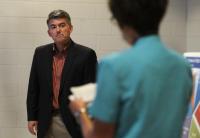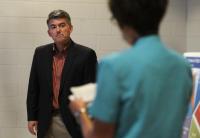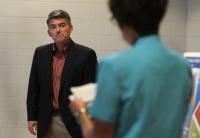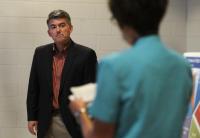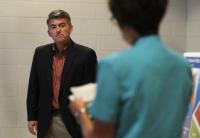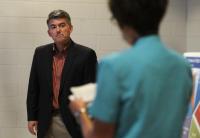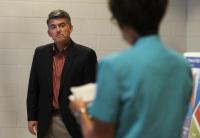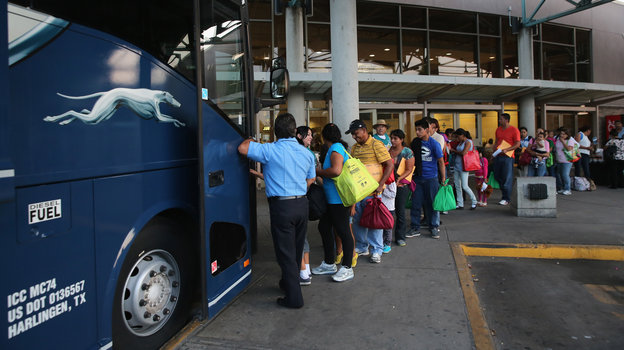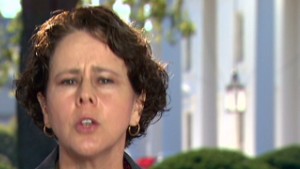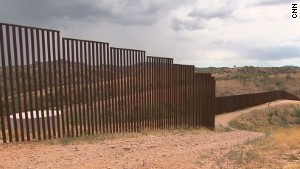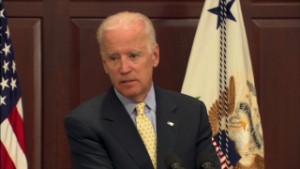WASHINGTON — There’s a story that Rep. Cory Gardner likes to tell when he’s asked about his position on illegal immigration. Although the details sometimes vary, it always involves a high school student from rural Colorado whom he met several years ago. When they meet for the first time, the young woman — whom Gardner doesn’t mention by name — is on pace to become valedictorian. But because she was brought into the U.S. illegally as a baby, she’s unable to attend college in Colorado at in-state rates. So she asks Gardner whether he supports changing the rules right away so she can afford a higher education. His response then — as it is now — is no. “Allowing passage of such a policy was avoiding the real problem,” Gardner recounted in testimony to Congress last year. “We can’t start with in-state tuition because we have to pursue meaningful immigration reform first.”
Fast-forward a few years. Gardner meets the young woman again — this time working at a restaurant in that same rural town. “The valedictorian of her high school, waiting tables,” he said with a downward glance.
The lesson, according to Gardner, is that Congress needs to get serious about passing immigration reform. But in such a way that it addresses security first — before tackling the needs of students such as that valedictorian-turned-waitress.
“This time, Congress cannot just talk about immigration reform. Congress must act,” Gardner said.
It’s a lofty anecdote told by a skilled politician.
But the woman in Gardner’s tale said there’s a different moral to the story.
“The most important thing that people should take away (when) reading about me is that I’m not asking for a handout,” said Rubi Gutierrez, 24, now living in Moorhead, Minn. Immigrants such as her, she said, simply want a chance to “earn our way to citizenship.”
“We just want to fit in and go to college with our friends,” she said.
Gutierrez said she left Colorado to attend Minnesota State University-Moorhead, where she graduated magna cum laude in 2012 with a degree in biology.
The school, she said, allowed residents accepted there to receive in-state tuition and had a “don’t ask, don’t tell” practice when dealing with immigration status. “The only school where I could find a loophole to get into college,” she said.
While she said it’s true that she ran into Gardner in Colorado as a waitress at the Trading Post Restaurant in Kit Carson, she said it was during the summer when she was trying to save money for college.
Asked whether she agreed with Gardner’s security-first approach, Gutierrez wouldn’t say. “I prefer not to comment on that,” she said.
But she said lawmakers such as Gardner — whom she called a “stand-up guy” — need to focus more attention on immigrants who are “college-aged” and can “contribute to society.”
“This isn’t just my story — I share it with thousands,” she said.
How Gutierrez feels, however, hardly matters — as least as it relates to the Republican from Yuma and his bid this year to unseat Democratic U.S. Sen. Mark Udall. Not only does she live in another state, but she can’t vote because she’s not a U.S. citizen.
Still, her story and how it interweaves with Gardner’s own tale could have an outsized impact on the politics of immigration in Colorado and which candidate, Gardner or Udall, ultimately returns to Washington next year. While many of these voters may have concerns about Gardner, Udall’s record includes at least one past vote that may give them pause as well — although activists say Udall has since changed “dramatically.”
Polling consistently has shown the two candidates are neck and neck, and analysts and activists say Latino voters, who account for an estimated 14 percent of the Colorado electorate, could be the tipping point for either candidate.
Whether that happens, however, depends largely on Latino turnout — which has lagged in nonpresidential elections. Indeed, only 57 percent of the Latino electorate in Colorado is registered to vote, according to a report issued in June by Latino Decisions, a political research firm.
But another finding in the report, which was commissioned by the immigrant advocacy group America’s Voice, raised the possibility that immigration could be a major motivating factor.
Two big reasons: An estimated 63 percent of Colorado Latino voters know an “undocumented immigrant,” and an additional 35 percent “know people who have been deported or detained for immigration reasons,” according to the report.
“As American citizens, these voters are not personally at risk of deportation or in need of relief from such pending action. Yet, the issue resonates at a high decibel,” the authors note.
And the sound coming so far from the Gardner-Udall race is one that echoes the national debate over immigration policy — with a few key distinctions.
Broadly, the biggest difference between the two candidates is how they view the immigration package approved last summer by the Senate. The bill, which passed 68-32, tried to address topics from border security to citizenship.
It would roughly double the number of border agents to nearly 40,000 and add an additional 350 miles of fence to the U.S.-Mexico border while creating a 13-year pathway to citizenship for many of the estimated 11 million immigrants living illegally in the country. At the same time, Gutierrez and other immigrants brought to the country as children could qualify for citizenship in about five years.
Udall backed the bill with the rest of the Democratic caucus and 14 Republicans; afterward, he called it a “historic victory.”
“Coloradans often note that the Senate is gridlocked, but … senators from both parties found common ground and delivered on the promise to fix our broken immigration system,” he said in a statement.
The bill’s bipartisan support, however, has had little impact on the GOP-controlled House, where conservatives in the Republican Party continue to block efforts to bring it up.
The main argument made by opponents is that the bill creates a pathway to citizenship for immigrants here illegally without first ensuring that the country’s borders are secure — a point Gardner has repeated on several occasions.
“Any immigration-reform effort must begin first with border security and enforcement of the law,” Gardner said in prepared remarks last year. “(And then) we may look to other reform provisions.”
Despite his opposition to the Senate bill, Gardner has tried to appear conciliatory. During the State of the Union speech this year, Gardner was one of only a few Republicans to rise to his feet and applaud when President Barack Obama urged the House to “get immigration reform done this year.”
“I think we can all agree that the system is broken,” Gardner said at the time.
More recently, Gardner was one of only 11 House Republicans to vote against a bill that would overturn the White House initiative Deferred Action for Childhood Arrivals, or DACA. The 2012 policy essentially bars authorities from deporting young immigrants for a minimum of two years.
Some Republicans have blamed DACA for triggering the recent wave of child immigrants at the U.S.-Mexico border, but Gardner said the bill would create more problems.
And he said he felt for immigrants such as Gutierrez.
“I’m excited for her,” he said when told of her collegiate success — although he again emphasized that measures that would help students such as her attend college must be part of broader immigration reform.
“If you do things as a stand-alone, we’re not addressing a problem,” he said, although Colorado recently has done so.
His stance has failed to impress prominent voices within Colorado’s Latino community, many of whom see Gardner’s support of a security-first approach as a ruse for not doing anything.
Victor Galván, of the Colorado Immigrant Rights Coalition Action Fund, questioned Gardner’s motivation in opposing the DACA repeal bill. “If he’s trying to cover up his anti-immigrant record of the last several years with a last-minute ‘show’ vote, he won’t be winning any votes in our community,” Galván said in a statement.
Last year, Gardner voted to support a similar effort to counteract DACA — which was introduced by an immigration hard-liner, U.S. Rep. Steve King, R-Iowa. Gardner attributed the change to timing.
“The immigration debate is in a different place than it was,” he said in a statement.
Udall’s campaign has attacked that switch and highlighted other immigration votes taken by Gardner, notably his opposition to a bill in 2006, when he was still a state lawmaker, that would prohibit the extortion of immigrants over their status — a vote Gardner said he couldn’t recall.
“You can’t play Etch A Sketch with people’s lives just because your political ambitions have changed,” Udall spokeswoman Kristin Lynch said in a statement.
But Gardner isn’t alone in changing his views.
Immigration activists still recall a vote that Udall took in 2005 — while he was a member of the U.S. House — that essentially would “criminalize the 11 million undocumented immigrants in this country,” according to a letter denouncing the bill written by the American Immigration Lawyers Association.
“Besides embodying an ‘enforcement only’ approach to immigration reform that has proved to be ineffectual in addressing our immigration challenges, this bill presents a boldfaced attack on immigrants and our constitutional commitment to fair process,” the group noted.
In an attempt to explain the 2005 vote — in which Udall joined with just 35 other House Democrats in support — his campaign points to a speech he made that year about its merits.
At the time, Udall said he didn’t like the anti-immigrant rhetoric or the bill’s push to make “every man, woman and child who overstays a visa or resides in this country illegally a criminal.”
But he said he supported the bill “because we have to make necessary investments in border security and enforcement.”
Julie Gonzales, of the Colorado Latino Forum, recalled that vote and activists’ displeasure over it, but she said that since then, Udall “has changed his position on immigration dramatically.”
Not only did Udall vote for the 2013 Senate bill, she said, he has publicly supported the idea that Obama should use executive action, similar to the DACA decree, to address the immigration issue if Congress doesn’t act.
“I think that was a reflection of him … trying to get the right thing done,” she said.
In spite of the red-hot rhetoric over immigration, a healthy debate remains over its potency during a campaign. And there have been questions — tied to the recent border crisis — over whether there is a rebound in public opinion toward more enforcement.
A CNN/ORC poll from mid-July revealed that Americans find immigration less important than issues such as the economy, education and health care.
That trend has even been observed among Latino voters. A 2013 survey by the Pew Research Center found that “some 57 percent of Hispanic registered voters called education an ‘extremely important’ issue,” but “just 32 percent said immigration.”
Meanwhile, the CNN/ORC poll from mid-July hinted at another possible trend. In three polls taken between September 2012 and January/February of this year, more respondents said they considered it more important to help immigrants here illegally become legal residents than to deport them.
Those numbers flipped, however, in the most recent poll.
The border situation “complicates the picture,” said Michele Swers, a political scientist at Georgetown University.
Immigration is “not as positive (an issue) for Democrats,” she said, because the stories about the children at the border take the focus away from immigrants such as Gutierrez and the Democratic candidates who support her pathway to citizenship.
It also could help explain why a recent poll by Quinnipiac University showed that Udall and Gardner were statistically tied when it came to the issue of immigration.
But a Colorado political scientist who taught Gardner years ago warned that the Republican congressman had a tightrope to walk on the immigration issue.
“He’s positioned himself rather well for a Republican. But he has to be careful,” said Stephen Mumme, a politics professor at Colorado State University. “He could easily offend both his base and Hispanics as he goes forward on this issue.”
Still, the biggest wild card in Colorado’s Senate race may be Obama.
If the president takes action on immigration before Election Day — renewing or expanding DACA, for example — it could provide a major boost for Democrats who probably need Latino support to win.
“If Obama does something between now and November, Udall should get a boost in turnout,” said David Damore, a political scientist at the University of Nevada-Las Vegas.
In the meantime, Gutierrez said she hopes that Gardner keeps telling his — and her — story.
“It’s putting a face to an issue that is not going away,” she said.
Mark K. Matthews: 202-662-8907, mmatthews@denverpost.com or twitter.com/mkmatthews
Denver Post librarian Vickie Makings contributed to this report.
Source Article from http://www.denverpost.com/election2014/ci_26308451/immigration-issue-could-tip-scales-colorados-u-s?source=rss
Immigration issue could tip scales in Colorado's U.S. Senate race
http://www.denverpost.com/election2014/ci_26308451/immigration-issue-could-tip-scales-colorados-u-s?source=rss
http://news.search.yahoo.com/news/rss?p=immigration
immigration – Yahoo News Search Results
immigration – Yahoo News Search Results




